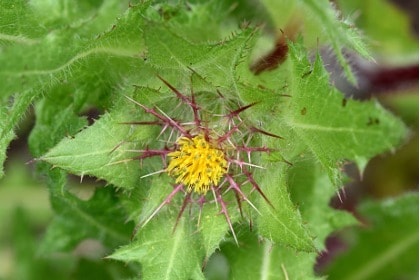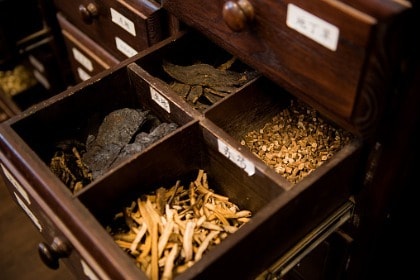Blessed Thistle: A Bitter Herb Long Viewed As a “Gift from God”
In a hurry? Click here to read the Article Summary...
Blessed Thistle is a bitter herb that’s so versatile and can be beneficial for so many ailments, it has often been thought of as a “gift from God.” Perhaps that’s why the many other names it goes by all have a holy or saintly element to them: Holy Thistle, St. Benedict’s Thistle, Cardo santo, and Cnicus Benedictus.
What Is Blessed Thistle?
Blessed Thistle (not to be confused with its close cousin, Milk Thistle) is an annual flowering plant with leathery leaves and a thorny, weed-like appearance.
Blessed Thistle is part of the Asteraceae family, as are most thistle plants. This family is huge, comprising over 32,000 different varieties. Another name for this categorization is the “daisy” or “aster” family [1].

Blessed Thistle is native to the Mediterranean region of Western Europe and has been used medicinally there for centuries. Since the Middle Ages, it’s been touted as a general tonic for all-around health.
Cnicus Benedictus is also what’s known as a “bitter” herb, and as such contains unique and deeply healing properties for humans. Just a few of its uses include:
- as a source of assistance for digestion and elimination
- as an antibacterial and anti-inflammatory
- as a good source of antioxidants, and
- as a detoxifier
Cnicus benedictus: The Benefits of a “Bitter” for Better Digestion
All foods have a certain taste; most of us are familiar with and even crave tastes such as sweet or salty. The bitter taste goes unnoticed and unappreciated by most palates, however. This is a shame because “bitters,” as they are often referred to, are among some of the most healing foods on the planet.
All bitter foods can aid the digestive process, and Blessed Thistle is no exception. In Ayurvedic medicine, bitter foods are thought to balance stomach acid and can work as natural diuretics and stimulants for bowel movements.
In Chinese medicine, bitters are thought to “cool down” the body, acting as a substance to help release the buildup of excess body fluids that can add heat. Chinese medicine practitioners also believe that bitters can strengthen the small intestine, return balance to the microbiome, and that they’re also very beneficial for the heart.

Recent research supports the ancient reverence for bitter foods as excellent for digestive health, optimizing nutrient absorption, and improving the gut microbiome.
For example, bitter melon, a common bitter plant, was shown to help alleviate ulcers in a 2009 study published in the journal Ethnopharmacology [2]. The common bitter herb dandelion may be helpful in combatting obesity because of the way it supports the pancreas, according to research conducted at Auburn University in Alabama [3].
Besides Blessed Thistle, dandelion, and bitter melon, there are dozens of other fruits, vegetables, and herbs that contain bitter elements. Examples of other common bitters include:
- kale
- cranberries
- apple cider vinegar
- grapefruit
- coffee
- cacao
- ginger
- artichoke
- arugula
- red wine
- chicory
Cnicus benedictus for Women’s Health and Fighting Infection
What it can do for circulation is one of the reasons why Blessed Thistle is often used to stimulate mother’s milk for nursing new moms. On the other hand, Blessed Thistle can also have an effect on the endocrine system as a whole, helping to balance hormones when taken in the right amount.

Anecdotal accounts as well as evidence-based studies have connected Blessed Thistle to relief from the headaches, mood swings, and overall cramping that is often associated with the menstrual cycle for so many women. Note: It’s important to seek out the guidance of a natural health professional if you’re considering using Blessed Thistle in this capacity.
Blessed Thistle is also antibacterial and can help with infections both internally and on the skin’s surface. It can aid with respiratory infections, help lower inflammation, and has been said to be a tonic for the brain as well.
A 2014 study conducted by researchers at Ankara University in Turkey found that all members of the Asteraceae family contain high levels of antioxidants that can help to detoxify the body of harmful substances [4].
Unlike Milk Thistle, which contains a substance called silymarin, Blessed Thistle contains tannins. These are polyphenol phytonutrients that can protect the body from oxidative stress [5].
The properties within Blessed Thistle have been shown to be powerful detoxifiers and a strengthener of both the liver and the kidneys. Let’s explore next how Blessed Thistle can help the detoxification pathways in the body in particular.
The Many Ways That Blessed Thistle Herb Can Help with Detoxification
There are a few reasons why Cnicus benedictus is thought to be a powerful ally for our detoxification systems. The first reason is, again, because of its categorization as a “bitter.” You already learned about the benefits bitters can have for the gut, but in reality, bitters can be beneficial for ALL the organs.
Bitters help to stimulate the organs and get them moving again. The “reflex response” that bitters evoke in the body helps with elimination, but they actually can stimulate the glands as well, helping the liver, kidneys, and lymphatics in the process.

In the case of Blessed Thistle, it stimulates bile production, making it an ideal constituent to add to any liver detox program. Using Blessed Thistle for liver health can dramatically increase your energy, help you to fight fatigue, and turn that “brain fog” into clear thinking for a super productive day.
The presence of glycosides is one of the tell-tale characteristics of a bitter plant such as Blessed Thistle. Glycosides derived from plants can be found in many pharmaceutical drugs and can potentially be poisonous when taken in large amounts.
When they’re consumed in their natural form through bitter fruits, vegetables, and herbs, however, their purging and anti-inflammatory effects are safe and can be strong allies in our toxic world [6].
Herbalists throughout the ages have used Blessed Thistle, in particular, to purge the body of toxins and for healing illness in general. Many homeopathic formulas for hepatitis, jaundice, and inflammatory conditions such as arthritis contain derivatives of the herb as well.
Get the Detoxifying Support You Need Through Cleansing Herbs
Your body needs to detoxify waste, clean up dead tissue, and get rid of pathogenic residue every day, and it must rely on certain organs in order to do that. The best way to ensure that your liver, kidneys, blood, and other detoxifying pathways are doing their job is to:
- stay away from toxins as much as possible
- eat a clean, organic diet
- limit stress
- drink lots of clean water, and
- get plenty of physical activity

Of course, it can be difficult to achieve all of these things all the time in the modern world we live in. According to Chemical & Engineering News, no one actually knows how many chemicals are in use in the U.S. today. In 2017, the Environmental Protection Agency [EPA] had more than 85,000 on its inventory of substances that fall under the Toxic Substance Control Act [8].
Many of these chemicals have not been tested for what they may do to negatively affect health. Unfortunately, many of these same chemicals wind up in our drinking water, in the air we breathe, in the food that we eat, and in the products we use to clean our homes, offices, cars, and even our bodies.
When detoxifying pathways are overburdened, that is when disease sets in. Even if you do all that you can to protect yourself and your family from toxins, exposure in some way is simply inevitable in today’s chemically dependent world.
Therefore, we must take it upon ourselves to be proactive when it comes to our toxic load. This includes doing what we can to gently detoxify our bodies regularly and support our intrinsic detoxification pathways like the liver.
Luckily, this is where specific herbals formulas can come in. High-quality herbal formulas that contain specific “herbal detoxifiers” such as Blessed Thistle can make all the difference, and not just for longevity and disease prevention. Adding detoxifying herbs to your health regimen can also result in significant improvements in how you feel physically, mentally, and emotionally every day.
Tip: Organic Blessed Thistle (leaf & stem) is one of six key ingredients in new Organixx Daily Detox powder.
Organixx Daily Detox combines 6 key superfood ingredients to support your body’s natural detox response system for improved immunity & health.

 Sources:
Sources:
Article Summary
Blessed Thistle is a bitter herb with many saintly and holy names including Holy Thistle, St. Benedict’s Thistle, Cardo santo, and Cnicus Benedictus.
Different from milk thistle, Blessed Thistle is an annual flowering plant with leathery leaves and a thorny, weed-like appearance.
Bitter foods (also known as “bitters”) are among the most healing foods on the planet. They’re known for balancing stomach acid and can work as natural diuretics and stimulants for bowel movements.
Blessed Thistle can also have an effect on the endocrine system as a whole, helping to balance hormones and aiding with issues related to menstruation.
It also stimulates bile production, making it an ideal constituent to add to any liver detox program. Herbalists have long used it for purging the body of toxins and for healing illness in general.
Organic Blessed Thistle (leaf & stem) is one of six key ingredients in new Organixx Daily Detox powder.




So very interesting. Thank you
You're welcome, Angelika. We're glad to hear you enjoyed this post!